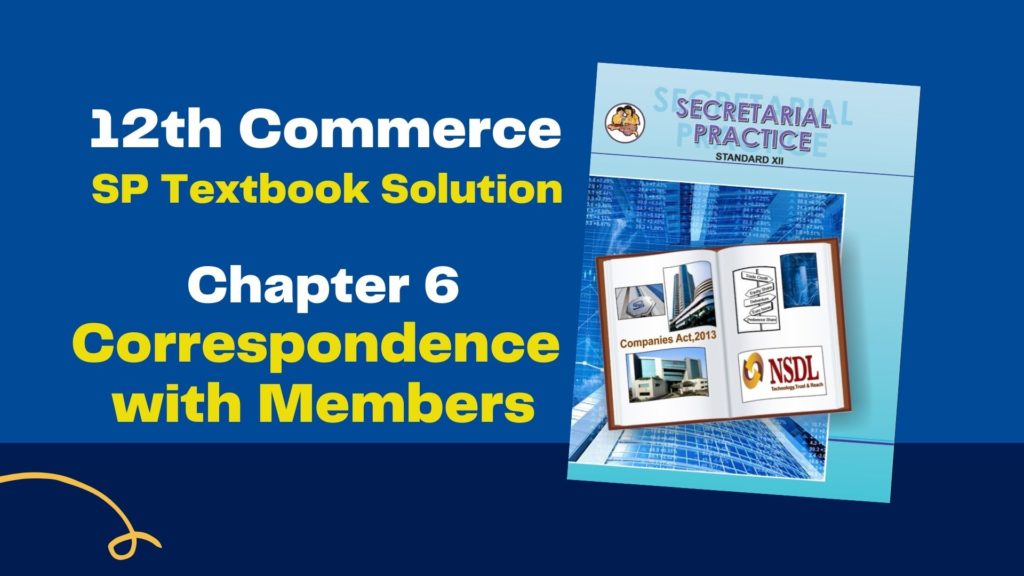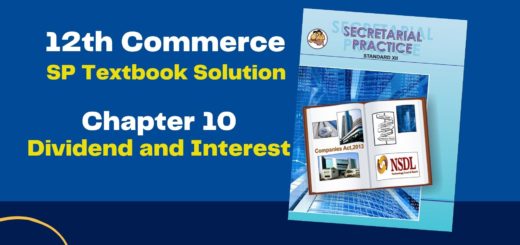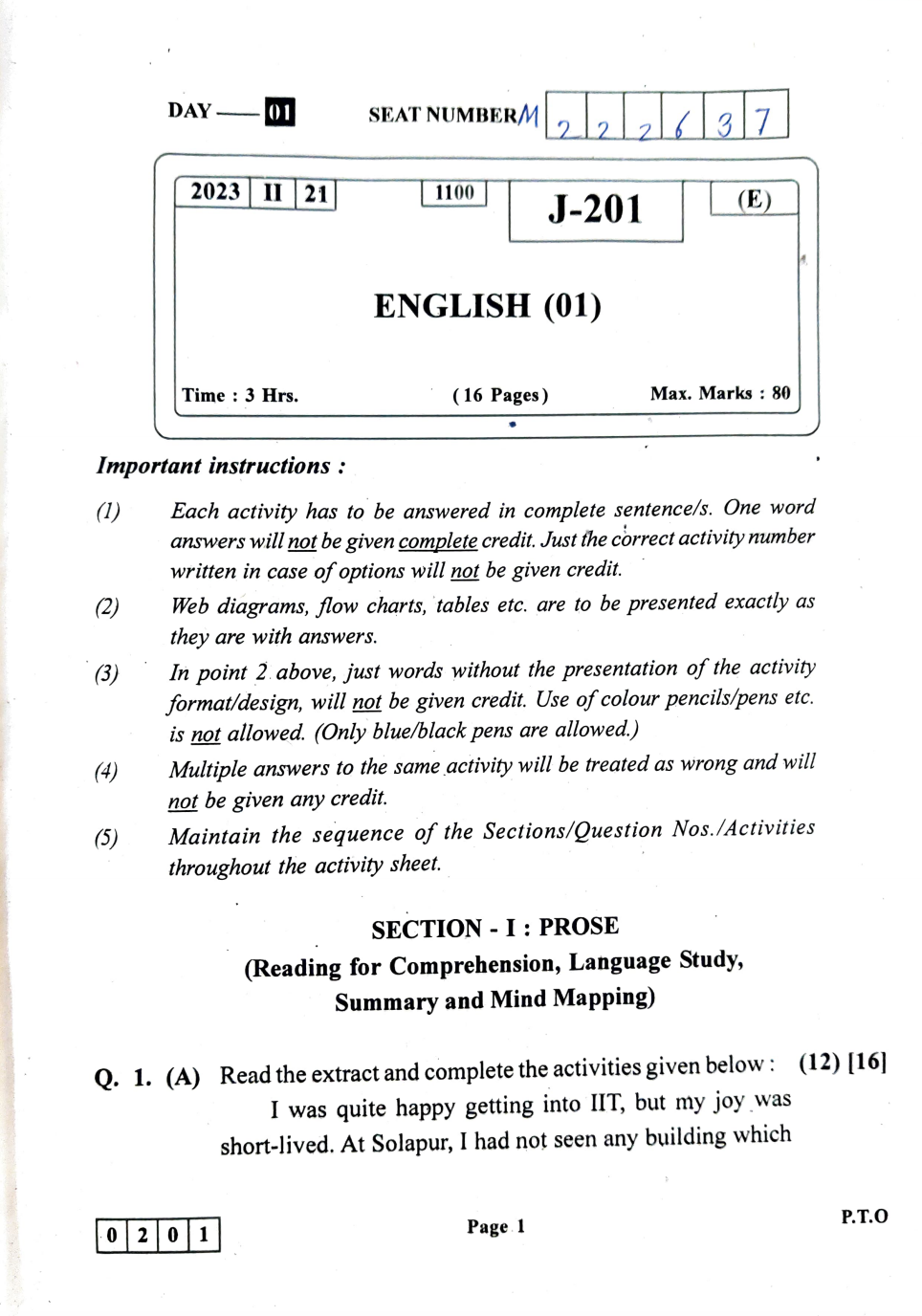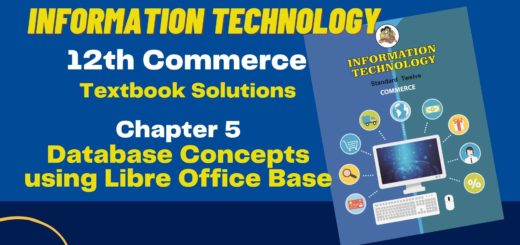12th SP Chapter 6 Solution (Correspondence with Members) – Maharashtra Board – Free Solution
Table of Contents
12th SP Chapter 6 Solution

Chapter 6
Correspondence with Members
Q.1 A) Select the correct answer from the options given below and rewrite the statements.
1. Directors are the _____.
a) paid employee of the company
b) representatives of the shareholders
c) creditors of the company
2. Dividend is to be paid to the shareholders within _____ days from the date of declaration.
a) 30
b) 40
c) 20
3. Registered shareholders receive dividend through _____ warrant.
a) share
b) debenture
c) dividend
4. Shares issued free of cost to the shareholders are known as _____ shares.
a) preference
b) equity
c) bonus
5. Share Certificate should be ready for delivery by the company within _____ months after the allotment of shares.
a) 3
b) 5
c) 2
6. Secretarial correspondence with members should be _____.
a) lengthy
b) shortcut
c) prompt and precise
7. Dividend is recommended by _____.
a) Board of Directors
b) shareholders
c) Depositors
8. Dividend is paid out of _____ of the company.
a) Capital
b) Building Fund
c) Profit
9. _____ is issued by the company to its registered shareholders after the declaration of dividend at the Annual General Meeting of the company.
a) Dividend Warrant
b) Interest Warrant
c) Share Warrant
Q.1 B) Match the pairs.
| Group A | Group B |
| a) Private Company | 1) Instrument for payment of Interest |
| b) Return on Shares | 2) Capitalisation of Building Fund |
| c) Bonus Shares | 3) Electronic Clearing Service |
| d) ECS | 4) Capitalisation of Reserve Fund |
| e) NEFT | 5) National Electronic Fund Transfer |
| 6) Dividend | |
| 7) Electronics Co-operative Society | |
| 8) National Electronic Fixed Transfer | |
| 9) Instrument for Payment of Dividend | |
| 10) Interest |
Answers.
a. 9) Instrument for Payment of Dividend
b. 6) Dividend
c. 4) Capitalisation of Reserve Fund
d. 3) Electronic Clearing Service
e. 5) National Electronic Fund Transfer
Q.1 C) Write a word or a term or a phrase which can substitute each of the following statements.
1) Shares given free of cost to the existing equity shareholders.
Ans: Bonus Shares
2) Instrument for payment of dividend.
Ans: Dividend Warrant
3) The shareholders to whom the bonus shares are issued.
Ans: Equity Shareholders
4) The authority which recommends the rate of dividend.
Ans: Board of Directors
5) An officer who comes into contact with all the members of the company through correspondence.
Ans: Company Secretary
6) A special kind of cheque issued by a company on its banker to pay certain sum of money as dividend to its members.
Ans: Dividend Warrant
Q.1 D) State whether the following statements are true or false.
1) Bonus shares are issued to existing equity shareholders.
Ans: True
2) Building fund is used for issue of bonus shares.
Ans: False
3) Bonus shares mean capitalization of the reserve fund.
Ans: True
4) Registered shareholder gets dividend through dividend coupons.
Ans: False
5) Dividend is the portion of the profits of the company which is allotted to the holders of the debentures of the company..
Ans: False
6) Every company must issue or despatch a share certificate to the allottee within three months after the allotment of shares.
Ans: False
7) A complaint letter should not be replied promptly.
Ans: False
Q.1 E) Find the odd one.
1. Secrecy, Dividend, Interest.
2. Bonus Letter, Dividend Letter, Board of Directors.
3. Dividend Warrant, Interest Warrant, Demat.
4. Secretary, Board of Directors, Dividend, Lucid Language.
Balbharti Textbook Solutions for other subjects
Solution of all Chapters of SP
1 – 2 – 3 – 4 – 5 – 6 – 7 – 8 – 9 – 10 – 11 – 12
Q.1 F) Complete the sentences.
1. Dividend is recommended by Board of Directors .
2. A company capitalizes its Reserve Fund for issue of Bonus shares.
3. Payment of dividend must be made within 30 days of its declaration.
4. Dividend is approved by the Shareholders in the Annual General Meeting.
5. The Secretary has to communicate the decisions of the management to the members by conducting correspondence.
Q.1 G) Select the correct option from the bracket.
| Group A | Group B |
| a) Return on shares | 1) Dividend |
| b) Capitalisation of Reserve Fund | 2) Bonus shares |
| c) Correspondence | 3) Written communication |
| d) ECS | 4) Payment of Dividend Electronically. |
Q.1 H) Answer in one sentence.
1) What is Dividend Warrant?
Answer: A document that shows that a shareholder is entitled to a dividend. Or an order of payment in which a dividend is paid. The company pays dividend to its shareholder in a document form known as dividend warrant.
2) What is Capitalization of Reserve?
Answer: It means the conversion of reserve of any type – capital or revenue – into share capital. The typical methods are issue of fully paid bonus shares and conversion of partly paid shares into fully paid shares by utilizing reserves.
3) What is Dividend?
Answer: Dividend is a part of profit paid to the shareholders as a return on investment.
4) Who recommends the rate of dividend?
Answer: Board of Directors recommends the rate of dividend.
5) Which type of shareholders enjoy the benefit of Bonus Shares?
Answer: Equity shareholders enjoy the benefit of Bonus Shares.
6) What is meant by payment of dividend electronically?
Answer: Payment of dividend electronically means transferring dividend directly into the account of shareholders through electronic mode like ECS or NEFT.
Q.1 I) Correct the underlined word/s and rewrite the following sentences.
1) Dividend is recommended by shareholders.
Answer: Board of Directors
2) The person who purchases shares of the company is called Depositor.
Answer: Shareholders
3) Bonus shares are issued as a free gift to the preference shareholders.
Answer: Existing Equity.
4) Payment of dividend must be made within 21 days of its declaration.
Answer: 30
5) A company must issue the Share Certificate within three months of allotment of shares.
Answer: Two
Q.1 J) Arrange in proper order
1)
a) Allotment of shares
b) Application for shares
c) Share certificate
Answer: (b) Application for shares (a) Allotment of shares (c) Share certificate
2)
a) Member
b) Applicant
c) Bonus Shares
Answer: (b) Applicant (a) Member (c) Bonus Shares
Q.2 Explain the following terms/concepts.
1) Capitalisation of Reserves
Answer: a) It means the conversion of reserve of any type – capital or revenue – into share capital. The typical methods are issue of fully paid bonus shares and conversion of partly paid shares into fully paid shares by utilizing reserves.
b) The shareholders can gain from the capitalization of reserves only if the rate of dividends is not proportionately reduced. Capitalization of reserves is generally resorted to by a company that has built up substantial reserves.
2) Bonus Shares
Answer: a) Bonus Shares are fully paid up shares given by a company as a gift, out of its accumulated profits or reserves to existing equity shareholders in proportion of shares held by them.
b) It is given free of cost.
c) Bonus shares are additional shares given to the current shareholders without any additional cost, based upon the number of shares that a shareholder owns. These are company’s accumulated earnings which are not given out in the form of dividends, but are converted into free shares.
3) Dividend Warrant
Answer: a) A document that shows that a shareholder is entitled to a dividend. Or an order of payment in which a dividend is paid. The company pays dividend to its shareholder in a document form known as dividend warrant.
b) It is an order issued by a company and drawn upon its banker in favour of its shareholders for payment of dividend due to them. It is more like an instrument by which a company pays dividend back to its investors which is more like the form of a cheque.
Q.3 Answer in brief.
1) Which precautions are to be taken by the Secretary while corresponding with members?
Answer: The following precautions are to be taken by the Secretary while corresponding with members.
1) Correct Information:
The Secretary should always provide correct, up-to-date and factual information to the Members. Due care should be taken while giving facts and figures.
2) Lucid Language:
The Secretary must use simple words, and simple sentences and adopt a convincing style while writing letters to the Members. Technical words, long sentences should be avoided in the letter. It should be easy to understand.
3) Prompt Response:
The Secretary must be prompt in sending replies to the letters received from the Members. Any questions or queries raised by the members must be promptly replied by the Secretary. Complaint letters should be promptly attended to without any delay.
4) Secrecy:
The Secretary should not disclose any confidential information of the company to the Members. The Secretary should tactfully answer some letters without giving any secret information of the company.
5) Politeness:
A courteous letter shows sympathy, respect and mutual understanding. Politeness means use of courteous language. A complaint letter should be replied politely. Rude language should be strictly avoided while corresponding with Members.
6) Legal matters:
The Secretary should compulsorily follow relevant provisions of the Companies Act, 2013 with latest amendments and other relevant laws while corresponding with Members. While drafting these letters, if necessary Secretary should consult with legal advisor on certain matters.
7) Consideration:
The writer should due the importance and consideration to the reader and consider the problems of the member. While sending negative replies, he should draft these letters more carefully, so that Members should not be hurt.
8) Image of the Company:
The Secretary should try to project good image of the company in every situation. While drafting the letters, Secretary has to try his best to remove their doubts, queries and difficulties in a polite and courteous manner.
2) What are the circumstances under which Secretary undertakes correspondence with members?
Answer: The following are the few circumstances under which the Secretary enters into correspondence
with the members of the company.
1) Letter for the issue of Share Certificate
2) Letter for Payment of Dividend through
a) Dividend Warrant
b) Electronic Payment of Dividend
3) Letter for issue of Bonus Shares
4) Reply letter to the query of the member on low rate of dividend.
Q.4 Justify the following statements.
1) The Company Secretary should take certain precautions while corresponding with members.
Answer: The following precautions are to be taken by the Secretary while corresponding with members.
1) Correct Information:
The Secretary should always provide correct, up-to-date and factual information to the Members. Due care should be taken while giving facts and figures.
2) Lucid Language:
The Secretary must use simple words, simple sentences and adopt convincing style while writing letters to the Members. Technical words, long sentences should be avoided in the letter. It should be easy to understand.
3) Prompt Response:
The Secretary must be prompt in sending replies to the letters received from the Members. Any questions or queries raised by the members must be promptly replied by the Secretary. Complaint letters should be promptly attended to without any delay.
4) Secrecy:
The Secretary should not disclose any confidential information of the company to the Members. The Secretary should tactfully answer some letters without giving any secret information of the company.
2) There are certain circumstances when a Secretary has to correspond with members.
Answer: The following are the few circumstances under which the Secretary enters into correspondence
with the members of the company.
1) Letter for issue of Share Certificate
2) Letter for Payment of Dividend through
a) Dividend Warrant
b) Electronic Payment of Dividend
3) Letter for issue of Bonus Shares
4) Reply letter to the query of the member on low rate of dividend.
Thus, there are certain circumstances when a Secretary has to correspond with members
Q.5 Answer the following
1) Write a letter to the shareholder regarding issue of Bonus Shares.
Answer: For the answer refer to page no. 99 of Textbook.
2) Write a letter to the member for the issue of Share Certificate.
Answer: For the answer refer to page no. 95 of Textbook.
3) Write letter to the member for the payment of dividend through Dividend Warrant.
Answer: For the answer refer to page no. 96 & 97 of Textbook.
4) Write a letter to the member for the payment of Interim dividend electronically.
Answer: For the answer refer to page no. 97 & 98 of Textbook.
5) Draft a reply letter resolving the query of the member on low rate of dividend.
Answer: For the answer refer to page no. 100 of Textbook.
Balbharti Textbook Solutions for other subjects
Solution of all Chapters of SP
1 – 2 – 3 – 4 – 5 – 6 – 7 – 8 – 9 – 10 – 11 – 12
12th Commerce SP Textbook Solution
| Chapter Name | Solution Link |
| 1) Introduction to Corporate Finance | Click Here |
| 2) Sources of Corporate Finance | Click Here |
| 3) Issue of Shares | Click Here |
| 4) Issue of Debentures | Click Here |
| 5) Deposits | Click Here |
| 6) Correspondence with Members | Click Here |
| 7) Correspondence with Debentureholders | Click Here |
| 8) Correspondence with Depositors | Click Here |
| 9) Depository System | Click Here |
| 10) Dividend Interest | Click Here |
| 11) Financial Market | Click Here |
| 12) Stock Exchange | Click Here |
Check out other posts related to the 12th Commerce
| Textbook Solutions of 12th Commerce (All Subjects) | Click Here |
| Free pdf of 12th Commerce Textbooks | Click Here |
| 12th Commerce IT MCQ Preparation (Online Test) | Click Here |
| 12th Commerce Paper Pattern and Chapter Wise Marks Distribution | Click Here |
| Sample Paper of 12th Commerce for Practice | Click Here |
| Solved Sample papers of 12th Commerce to improve Paper Presentation | Click Here |
| Old Question Papers of 12th Commerce with solution (All Subjects) | Click Here |


